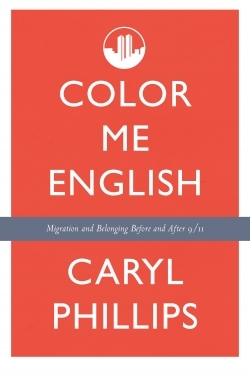Color Me English
Thoughts About Migrations and Belonging Before and After 9/11
Novelist, playwright, and non-fiction author Caryl Phillips has been the “other” in several cultures: in 1950s Britain after his family migrated from St. Kitts; in the US, where he spends part of the year on the faculty of Yale University; and during his many travels and academic postings worldwide. In the introduction to his latest collection of essays, he confesses to feeling some “immigrant kinship” with the only other black boy, apart from his brother, to attend his school when he was young; but he also admits to ostracizing Ali, a Muslim who had the misfortune of transferring schools at the already awkward age of thirteen, and whom no one else there could seem to treat humanely, either. Phillips recognized his weakness in the face of peer pressure, as well as his own cruelty because, even then, he was as reflective as any good writer needs to be.
As a young writer Phillips believed that race was the most divisive factor in British society and because of this, whole classes of people were separated and misunderstood. Flash forward to the present: how much has changed? Examining his early years and those of others, he reveals an urgency to understand the immigrant experience across Europe, where the threat of terrorism can often be traced to a form of cultural disaffection he is able to both critique and understand.
“Twenty years ago, I felt as though I was striving to do two things simultaneously. First, I was trying to become a writer. Second, I was still engaged in a struggle to recognize and protect my own identity, in all its intricacy, for I knew I had to view it as unique, complicated, open to inspection and re-examination, and binding me not to just a particular tribe, clan or race, but to the human race.” Phillips traces his identity to its origins on the African continent, to the Caribbean, and to his present-day circumstances as a true cosmopolitan with multinational addresses and sensibilities, all of which positions him well to think about themes of identity, isolation, and belonging in a world circumscribed, however obliquely, by the events of September 11th.
Phillips’s prose is down to earth and unhurried; he wants to bring us along with him and feel welcomed into the conversation. The idea that the writer has a place in helping people to understand themselves seems to be the motivation behind all of these essays, from reflections on Chinua Achebe’s critique of Conrad’s Heart of Darkness to the music of Luther Vandross to the writings of other international literary figures he admires.
At its best, an essay feels inclusive, and that can be said of those in Color Me English. Phillips’s mode is one that arrives at insights, but gently; as readers we are privy to what he thinks and wonders about, and are inclined to join him in the process.
Reviewed by
Holly Wren Spaulding
Disclosure: This article is not an endorsement, but a review. The publisher of this book provided free copies of the book to have their book reviewed by a professional reviewer. No fee was paid by the publisher for this review. Foreword Reviews only recommends books that we love. Foreword Magazine, Inc. is disclosing this in accordance with the Federal Trade Commission’s 16 CFR, Part 255.

